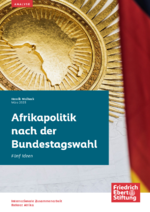The climate crisis is one of the greatest challenges in human history. It not only threatens the natural foundations of life worldwide, but also the economic and social development of entire societies. Limiting global warming to 1.5 degrees Celsius has become the linchpin of an ambitious, fair and development-promoting international climate policy that contributes to the protection of human lives and the preservation of livelihoods, biodiversity and species diversity.
The term ‘Just Transition’ originated with the trade unions in the late 20th century and has become an integral part of trade union vocabulary. Initially conceptualized by labor movements, it emphasized securing the livelihoods and rights of workers amidst shifts towards sustainable industries. This concept has evolved into a broader vision of an inclusive society that strives for a low-carbon economy featuring green and unionized jobs. It advocates for a strategic approach that places trade unions and workers as central actors in economic and political decision-making processes, commonly referred to as social dialogue. A just transition, therefore, calls for the protection of workers' rights during the transition to a more sustainable world, ensuring that no one is left behind as economies move away from fossil-fuel-based industries. Achieving a just transition worldwide demands an equitable distribution of responsibilities for climate change mitigation and adaptation which necessitates global cooperation and solidarity. Principles such as common but differentiated responsibility, the polluter pays principle and ensuring compensation for vulnerable communities affected by loss and damages need to be upheld. Key principles of ensuring a Just Transition are workers’ rights protection, social equity and inclusion, environmental sustainability, community engagement and policy coherence.
Overcoming the global climate crisis, requires mitigation and adaptation measures that are just and based on the involvement of all stakeholders. The moment to decarbonise the global economy is also a moment to restructure it to end inequality, marginalisation and current global imbalances. The instrument of a social dialogue offers the opportunity for a coordinated, just and inclusive transition.
With its project “Just Transition through Social Dialogue”, FES aims to support a just, fair, and inclusive transition to a low-carbon economy by emphasizing social dialogue as the main instrument. The participating country offices will focus on the agriculture, energy, and mining sectors. They will work to support their trade union partners in negotiating for their constituents' interests, forming strong and broad alliances with the climate justice movement, and establishing a social dialogue process in their respective countries. The goal is to achieve concrete results such as protecting and creating decent work, ensuring gender and climate justice, and contributing to an inclusive economy.
The project “Just Transition” forms part of the thematic fields of Energy and Climate Justice as well as Trade Union Cooperation.


